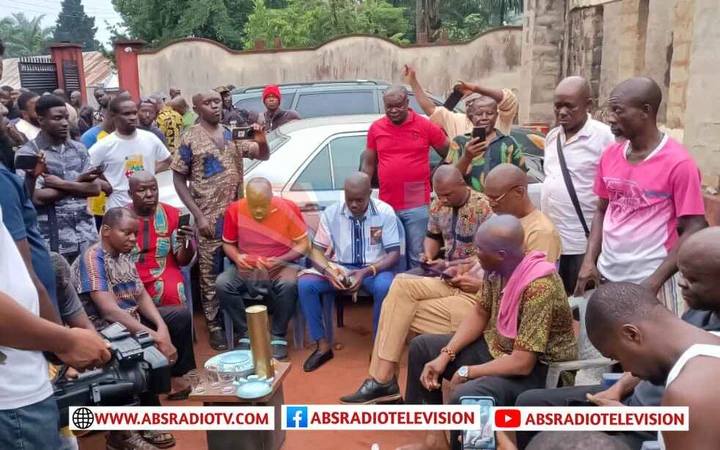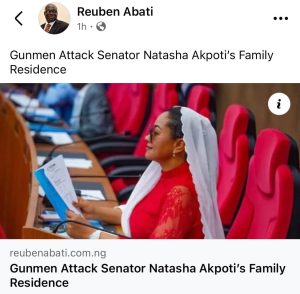Nnobi Community Celebrates Return of PG Okpala After Three Days in Onitsha Correctional Centre
Nnobi, a bustling town in Idemili South Local Government Area of Anambra State, recently bore witness to an outpouring of support and emotion as residents came out in their numbers to welcome back their embattled President General, Barrister Dominic-Savio Okpala. His return from the Onitsha Correctional Centre after a brief stint behind bars marked not just a personal milestone but a pivotal moment in the community’s contemporary political and cultural life.
The welcome he received was nothing short of triumphant. Gun salutes thundered through the air — more than twenty-one by some counts — as local drummers, masquerades, youths, elders, and well-wishers danced through the streets. From the symbolic Afor market to the heart of the Awuda and Ngo quarters, Barrister Okpala was paraded like a returning war hero. Supporters waved palm fronds, hoisted banners, and chanted songs of victory. The festive atmosphere belied the tension that had defined recent months.
But this was no ordinary homecoming. It followed a protracted and controversial legal battle rooted in constitutional disputes, generational power struggles, and divergent visions for the future of Nnobi.
YOU MAY READ
Breaking: Hon. Uchenna Harris Okonkwo Empowers Idemili Constituents
At the center of the storm was the proposed amendment to the Nnobi community constitution — a document that regulates local leadership selection, community resource management, and the roles of traditional and elected authorities. Barrister Okpala, a trained lawyer and reform-minded administrator, reportedly sought to introduce sweeping changes aimed at updating the decades-old framework to reflect modern governance realities.
However, his move was met with stiff resistance, particularly from the Awuda quarter, which accused him of acting unilaterally and bypassing due process. Tensions escalated after a court in Nnobi issued a restraining order barring Okpala from proceeding with a planned community meeting on December 31, 2024 — a meeting he allegedly convened regardless.
The matter reached a climax in April 2025 when Chief Magistrate Kenneth Nwoye of the Nnobi Magistrate Court found Okpala guilty of contempt. The court held that he had violated a standing order, imposed unauthorized fines on complainants, and acted in a manner inconsistent with respect for the rule of law. Consequently, he was remanded at the Onitsha Correctional Centre for three days until he purged himself of the contempt.
YOU MAY READ
Family announce funeral arrangements for banker murdered by kidnappers despite huge ransom payment in Anambra
The ruling sent shockwaves through Nnobi. While some saw it as a long-overdue check on executive overreach, others — particularly supporters of the President General — considered it a grave injustice and a deliberate attempt to stifle progress.
If Okpala’s detention was controversial, his release was nothing short of theatrical.
The celebration began early in the morning of his return, with groups assembling at key locations, waiting for news of his arrival. Local vigilante groups and youth organizations coordinated logistics, ensuring traffic control and security throughout the town.
As his convoy entered the community, the streets erupted. Traditional dancers performed in full regalia, while cultural troupes played flutes and gongs, accompanying the rhythmic gun salutes that punctuated the air. Women sang praises, likening him to biblical Joseph and Mandela. Young men on motorcycles flew flags bearing Okpala’s image and the words “Our PG, Our Hero.”
Supporters escorted him to the Afor market square, where he delivered a passionate address.
“What happened to me was not justice,” he said. “It was a premeditated script, written by enemies of progress, produced by conflict merchants, and directed by those who fear change.”
He pledged to continue working for peace, calling on aggrieved parties to embrace dialogue. His message, while conciliatory in tone, was also defiant in substance.
Despite the jubilant scenes, not everyone in Nnobi was celebrating.
YOU MAY READ
Uchenna Harris Okonkwo Expands “Light Up Idemili” Project to More Communities in Idemili North and South Federal Constituency
Some residents, particularly members of the ‘Concerned Nnobi Youths,’ expressed deep misgivings about the President General’s leadership style. In a protest held months earlier, the group accused Okpala of bypassing democratic norms and attempting to subvert the community’s power structure.
They also alleged he had supported the continuous stay of expired quarter chairmen and shown bias against the traditional ruler, Igwe Engr. Nich Obi. “The PG is acting like a warlord, not a servant of the people,” one protester had declared. “He wants to rewrite the rules without asking the players.”
The group had also appealed to the Anambra State Government and Governor Charles Soludo to intervene to prevent what they feared was an impending leadership crisis.
For them, Okpala’s incarceration was a vindication of their stance. His release and grand welcome, they argued, was mere optics — a distraction from the more urgent need for accountability, transparency, and unity in leadership.
What is unfolding in Nnobi is not just a legal matter, nor a petty political rivalry. It is a deeper, existential conflict between tradition and reform.
On one side is a President General determined to modernize community governance, streamline financial practices, and expand youth participation. On the other side are traditional elites and skeptical residents wary of sudden shifts that could alter the balance of power.
YOU MAY READ
The Anambra black and blue Rail Master Plan: A Vision for Sustainable Development and Connectivity
This tug-of-war has been playing out in town union meetings, WhatsApp groups, community churches, and ancestral shrines. It has divided friends, families, and age grades.
Some elders feel that the rapid changes Okpala is pushing lack sufficient grassroots consultation. Others, particularly among the youth, feel he is their best chance at rooting out corruption and positioning Nnobi for future development.
“Before Okpala came, people were selling land without accountability,” said Chibuzo, a youth leader. “He introduced financial audits and banned multiple levies. That’s why they want him out.”
But not everyone agrees. Adaeze, a market trader, told reporters, “All this noise and trouble is not helping our business. We want peace, not politics.”
Igwe Engr. Nich Obi, the traditional ruler of Nnobi, has so far maintained a cautious stance. While he has not openly condemned Okpala, reports suggest tension between the palace and the town union leadership.
The Igwe’s cabinet has expressed concern over the growing polarization and called for stakeholders’ meetings to address grievances.
Observers say the monarch’s role could prove decisive. If he chooses to side with reformists, it could signal a new era in traditional-institutional collaboration. But if he withdraws support, Okpala may find his position increasingly untenable, regardless of popular support.
For now, the Anambra State Government has maintained neutrality, though it is believed to be closely monitoring the situation.
Security agencies have increased presence in the area, fearing that further escalation could lead to violence. A senior police officer confirmed that plainclothes officers were deployed during the homecoming event to ensure law and order.
There are concerns that if the conflict festers, it could affect nearby communities and disrupt the fragile peace in Idemili South.
The crisis in Nnobi has opened a broader conversation about community leadership, the power of town unions, and the role of courts in regulating internal disputes.
The story of Nnobi and Barrister Dominic-Savio Okpala is a microcosm of Nigeria’s broader struggles with leadership, governance, and modernity. It shows how efforts to reform local institutions often face resistance — not necessarily because the ideas are bad, but because change is rarely linear or uncontested.
As Nnobi stands at this crossroads, the community has an opportunity to redefine its values, its vision, and its leadership DNA. Whether it chooses to seize that opportunity or succumb to factionalism will determine not just who leads, but where the town is headed.
Barrister Okpala’s return may mark the end of one chapter, but in truth, it is just the beginning of a larger, more complex story yet to unfold.
DISCLAIMER
This report is based on original writing, interviews, local sources, and publicly available information. It is intended to promote informed discourse and does not take sides in the ongoing conflict.





